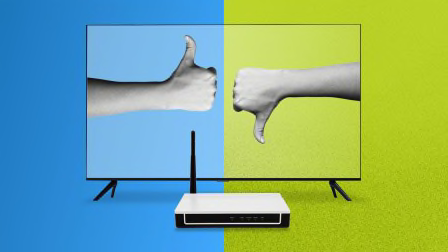How to Choose Between T-Mobile 5G Home Internet and the Competition
Cell phone companies want to be your high-speed internet service provider at home. Is it worth ditching your cable, satellite, or fiber-optic service?

The premise is simple: You’re already paying your wireless carrier for mobile data, so why not use the same company for your home internet, too, and potentially get a discount?
If, like many other people, you’re dissatisfied with the value or service you get from your current internet service provider (ISP), switching to 5G home internet service—also known as fixed wireless internet service or fixed wireless access (FWA)—could be an improvement.
With fixed wireless internet service, you get a modem and router that all your devices at home, such as TVs and computers, can connect to over WiFi or through an ethernet cable. It’s the same as getting internet through a cable, satellite, or fiber-optic service. The difference is that with 5G home internet service, the modem gets the data over the air from a cell phone tower (like how your phone gets its connection), rather than from a wire coming to your home.
AT&T Fixed Wireless Internet
AT&T’s Fixed Wireless service is an option only for certain rural households and small businesses. Unlike T-Mobile and Verizon, AT&T requires a technician to install an outdoor antenna and requires cell phone service with AT&T. The home internet service costs $60 per month, not including taxes and fees, and has a 350-gigabyte monthly data cap (overage fees apply). That might not be enough for some; the average household uses 536GB of broadband data per month, according to industry analytics company OpenVault.
Advertised speeds are relatively low, too, at 25 Mbps for downloads and 1 Mbps for uploads. The FCC defines high-speed broadband as having a minimum of 25 Mbps download and 3 Mbps upload.
So AT&T’s fixed wireless offering is the least attractive of the Big Three cell phone service providers and probably best only if you don’t have other broadband options.
AT&T offers a faster fiber-optic internet service, available in select areas in 21 states, which starts at $55 per month (if you use autopay) and with advertised speeds of up to 5 Gbps (gigabytes per second). An AT&T representative told us via email that the company is "considering ways [their] fixed wireless services can fill in pockets and hard-to-reach areas for some customers, but fiber remains [the company’s] focus."
T-Mobile 5G Home Internet
Unlike the other internet service providers, T-Mobile offers a 15-day test drive, so you can see if it’s a good fit for you. If you cancel within 15 days of activating the home internet service and return the equipment within 45 days of cancelation, the trial won’t cost you anything.
T-Mobile’s home internet service costs $50 per month with autopay ($55 per month without autopay), taxes and fees included—just like Verizon’s 5G home internet service. If you also have at least two cell phone lines on the Magenta Max plan, the price for T-Mobile’s home internet service drops to $30 per month with autopay. These rates are locked for as long as you maintain service.
According to T-Mobile, you can expect speeds anywhere between 33 and 182 Mbps for downloads, and 6 to 23 Mbps for uploads—that’s a huge range, and your actual speed can depend on a number of factors. I’m a data point of one, but in my Long Island, N.Y., home (in a small suburb with probably few people also on the same home internet service), I got between 91 Mbps down and 28 Mbps up on my MacBook Air with the gateway a few feet away from me.
T-Mobile is also starting to offer fiber-optic internet service of up to 940 Mbps, starting in New York City.
Verizon 5G Home Internet
Like T-Mobile, Verizon offers unlimited data on its 5G home internet service for $50 with autopay ($60 without autopay), taxes and fees included. If you have Verizon Wireless cell phone service (the Do More, Get More, Play More plan or the One Unlimited for iPhone plan), that rate drops to $25 per month with autopay ($35 without autopay). These rates are locked for at least a decade.
Advertised speeds are 85 to 300 Mbps for downloads, 10 Mbps for uploads. Verizon also offers a Home Plus plan for $10 more with 300 to 1,000 Mbps download, 50 Mbps upload, and a few perks, such as a gift card for DoorDash or Grubhub.
Verizon has a fiber-optic service, FiOS, with faster download and upload speeds with tiers of 300 Mbps, 500 Mbps, or 1 Gb, so it might be worth checking to see whether Verizon FiOS is available at your address.
Verizon FiOS’s 300-Mbps download and 300-Mbps upload plan starts at $50 per month with autopay and without the select Verizon cellular plans. The rate drops to $25 per month if you have the select mobile plan and autopay. A customer service representative told me that if FiOS is available at my address, it’ll be faster and more reliable than the home internet option.
More Fixed Wireless Internet Service Providers
Straight Talk, which runs on Verizon’s network, offers an unlimited 5G/LTE home internet service for $45 per 30 days (the pay date will move if the month has 31 days in it). Download speeds are 20 to 100 Mbps, and upload speeds are 3 to 10 Mbps. The router costs $100.
US Cellular also offers fixed wireless internet service, but it’s 4G rather than 5G service, and it’s available in only a few select areas in the country. Pricing is similar to T-Mobile and Verizon’s—$50 per month with autopay or $60 per month without autopay for unlimited data—but taxes and fees aren’t included, and customers must purchase the router/modem up front and have it for at least 36 months in order to get the equipment for free via monthly bill credits.




